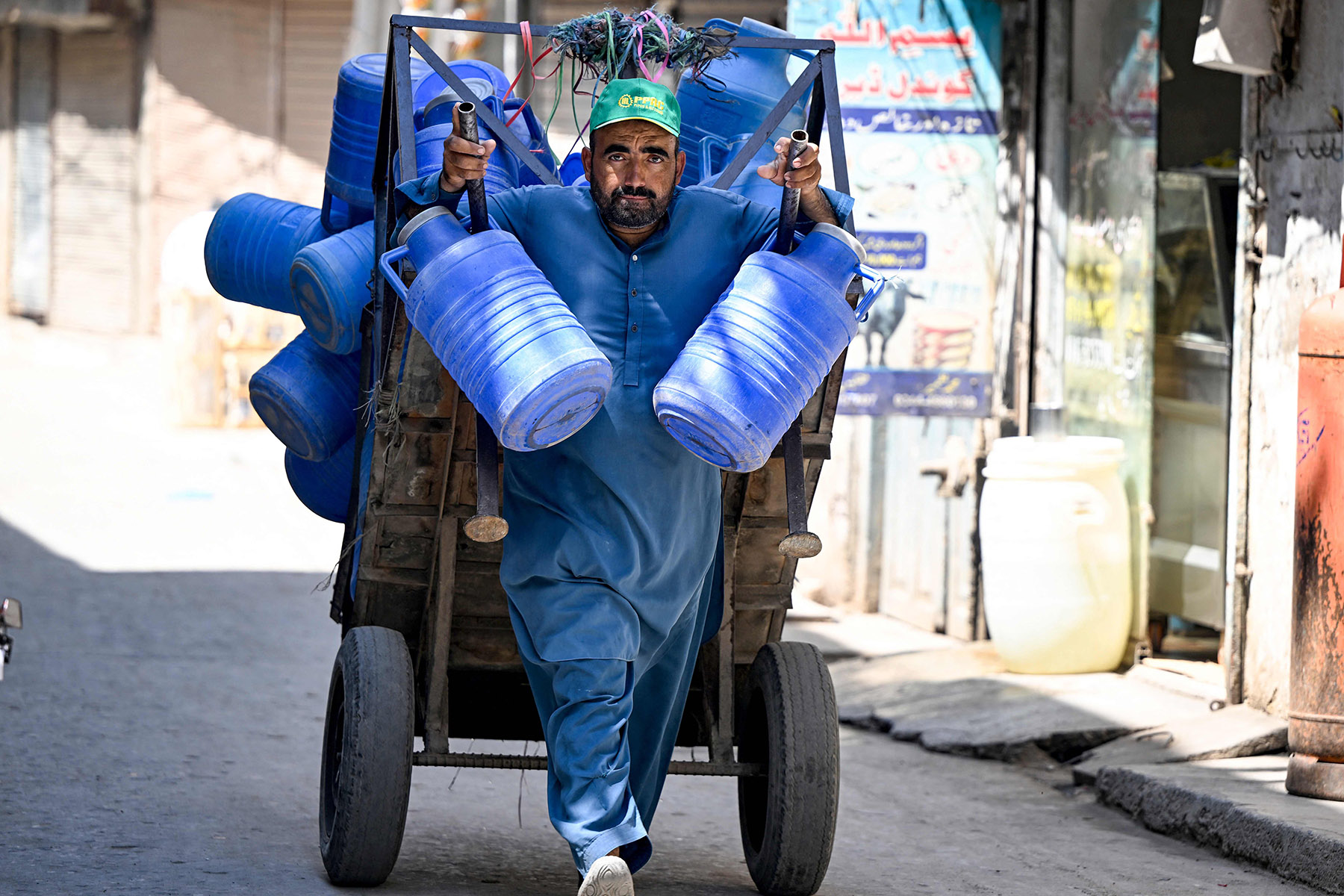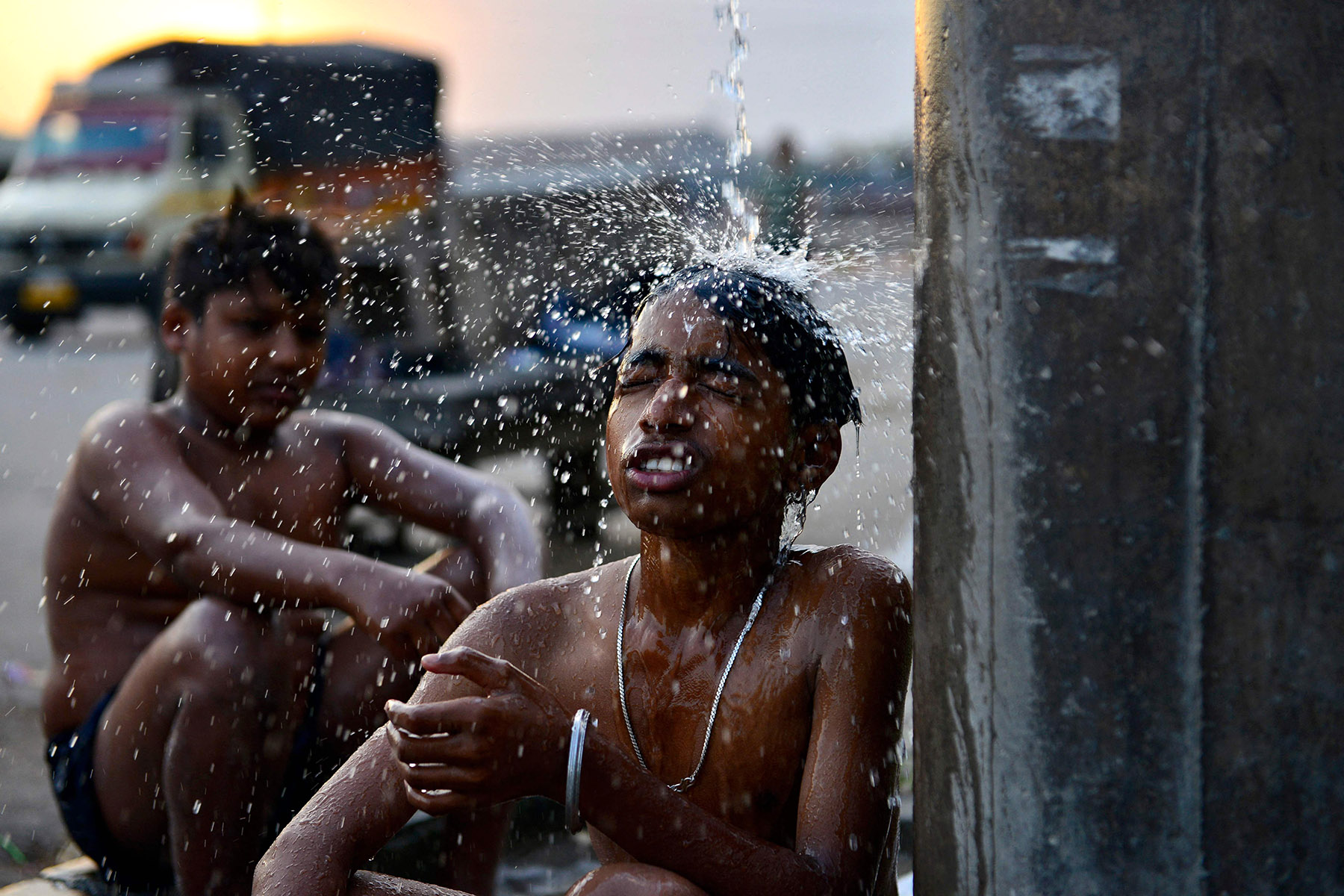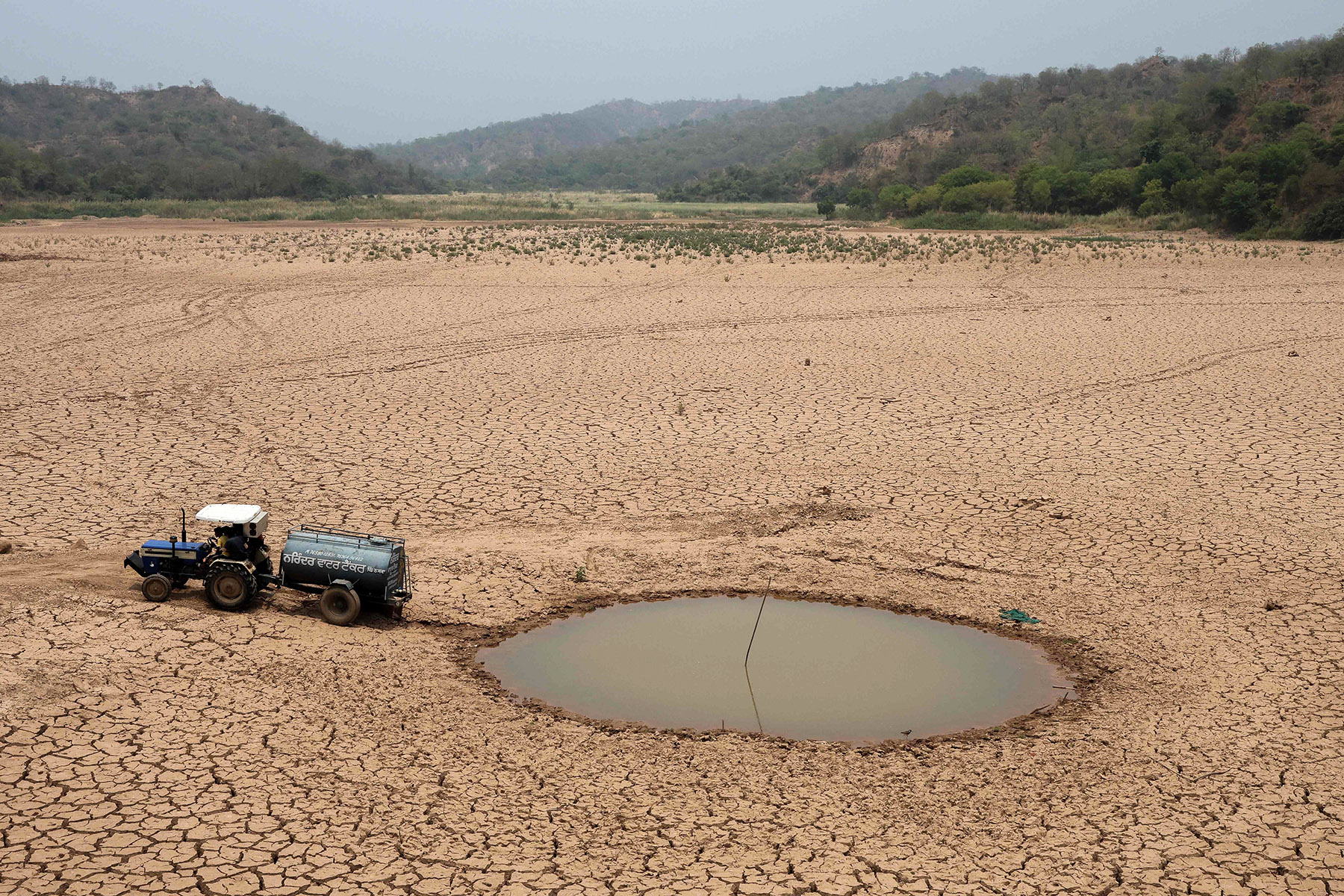Record temperatures affect people's daily lives, have impact on agriculture, highlight climate change challenges

Santosh Sikdar, 52, who does welding jobs for a small construction company in Kolkata, eastern India, finds the scorching weather "simply unbearable", but says he cannot afford to skip work, even for one day.
"This is a killing summer … a blast-furnace situation … hot, humid and sultry. Sometimes, I fear that I may collapse at any moment," he said.
Adaptation strategies are crucial for helping communities cope with extreme heat. These include developing heat action plans, improving early warning systems, and creating public awareness campaigns about heat exposure dangers and preventive measures.
Bagh Ali, Pakistani climate change expert
Authorities and experts in Kolkata, the capital of West Bengal state, advised people to stay at home, but Sikdar, who works for a daily wage, said that staying at home is not financially feasible.
"Even a day of missed work will mean that my family and I have empty stomachs," he said, questioning the "luxury" of staying indoors. "It is a matter of survival for us," he said.
Large parts of South and Southeast Asia are in the grip of unrelenting heat waves. New Delhi this summer recorded one of India's highest-ever temperatures of 49.9 C, while some areas in Pakistan hit 53 C.
READ MORE: China endures intensifying heatwaves amid global warming
Across the region, farmers have struggled to plant their crops, industries are facing labor shortages, and schools have shut for days amid the unrelenting heat.
Mehr Ghazanfar Abbas, a farmer in Layyah district in Pakistan's Punjab province, is one of those suffering. He recently collapsed under the blazing sun as he reached the middle of his field. Other farmers rushed to help, carrying him to a nearby medical unit where a doctor diagnosed him with sunstroke.

Vulnerable populations
The impact of the extreme heat in South Asia has been profound, escalating health risks such as heatstroke and dehydration, and affecting vulnerable populations like the elderly and impoverished, said Anjal Prakash, an associate professor and research director at the Bharti Institute of Public Policy, a think tank under the Indian School of Business.
"Agriculture suffers from crop failures and water scarcity, exacerbating food insecurity," said Prakash, who contributes to the UN's Intergovernmental Panel on Climate Change. "Additionally, extreme heat intensifies air pollution and exacerbates energy demands, leading to power shortages and economic strain."
India has had record heat in recent months, with temperatures hovering above 45 degrees for long stretches and even soaring beyond 50 degrees in some regions, according to the Indian Meteorological Department. Since May 14, the capital New Delhi had recorded at least 40 consecutive days of temperatures at or above 40 C till June 22, a department official said.
"I have spent almost four decades in Delhi, but I have never experienced such an excruciatingly painful heat wave," said Prasun Dutta, a retired electrical engineer.
The summer is "not only sapping and draining, it is financially ruining us," said Shyamapada Pal, a 40-year-old farm laborer from Bankura district in West Bengal. "It has been the severest, harshest and cruelest in recent memory."
There were more than 40,000 suspected heatstroke cases and at least 110 confirmed deaths between March 1 and June 18, when northwest and eastern India recorded twice the usual number of heat-wave days, an Indian Health Ministry official said.
More than 450 million people in India work in the informal sector, employed on farms, construction sites or at foundries. They have little job protection or rights, leaving them extremely vulnerable during times of severe weather.
The extreme heat has also depleted groundwater, and water reservoir levels are down to nearly 35 percent of capacity in some parts of the country. In many cities, including New Delhi, local authorities have announced water conservation measures, including a ban on car washing.
"Heat waves and their impacts on water resources will increase manifold in the near future," Sanjay Vashist, director of Climate Action Network South Asia, told environment magazine Down To Earth.
"Shrinking water resources can lead to conflict situations within a country, endangering national security."

Further risks
In neighboring Pakistan, mercury levels went as high as 53 C in the southern Sindh province.
The highest temperature ever recorded in Pakistan was 54 C in Turbat, Balochistan province, in 2017, the second highest temperature recorded in Asia and the fourth highest in the world, Sardar Sarfaraz, chief meteorologist at the Pakistan Meteorological Department, told China Daily.
In the wake of high temperatures and a heat wave in Punjab province, all public and private schools closed for seven days from May 25. However, schools were allowed to conduct scheduled exams with necessary precautions to ensure the safety of students, the provincial school education department said, according to Xinhua News Agency.
With a population of around 250 million, agriculture is the mainstay of Pakistan's economy, employing about 40 percent of the nation's labor force.
Agriculturalist Salman Shah Khagga recently told China Global Television Network (CGTN) that the heat wave in Pakistan is "causing significant stress to crops, especially vegetables. We are seeing a substantial reduction in yields for tomatoes, potatoes, cotton, and other staple crops, which will have a direct effect on the economy".
According to experts, crop losses may go beyond 30 percent this summer, causing food shortage as well as huge potential economic losses.
The Pakistani government has launched a public awareness campaign to counter the adverse impacts of the severe ongoing heat wave, according to Romina Khurshid Alam, coordinator to the Pakistani prime minister on climate change and environmental coordination.
Pakistan's climate is warming much faster than the global average, with a potential rise of 1.3 to 4.9 C by the 2090s over the 1986 to 2005 baseline, according to a World Bank expert panel on climate change, The Associated Press reported.
The country, which is one of the most vulnerable in the world to climate change, also faces the risk of heavier monsoon rains, in part because of its immense northern glaciers, which are now melting as temperatures rise.
This year's monsoon season will start in July, causing flash floods, according to Pakistan's National Disaster Management Authority.

Food crisis warning
Indonesian President Joko Widodo has warned his country will face heat waves and drought over the next four months, potentially leading to a food crisis.
Indonesia's Meteorology, Climatology, and Geophysics Agency (BMKG) has estimated that the heat wave and dry season will run from July to October, bringing a high possibility of drought, Xinhua reported. "This must be anticipated," Widodo said on a visit to Bapeang village, Central Kalimantan province, on June 26.
Widodo expressed concern that the dry season caused by the heat wave could reduce agricultural productivity, noting that this issue is not unique to Indonesia but affects many countries globally. The situation could worsen as other countries experiencing long droughts, and heat waves might also see their rice production decline. These countries might then prioritize their domestic consumption over exports, Widodo added.
Data from Indonesia's Ministry of Agriculture indicated that a food crisis can cause 7 to 16 percent of the population to experience hunger. With the country's population projected to reach 281.6 million in 2024, it is estimated that around 19.7 to 45 million people could be at risk of hunger.
"Currently, Indonesia is vulnerable to a hunger crisis. We have to boost our food production, especially rice, in the next three months," Indonesian Minister of Agriculture Amran Sulaiman said on June 25.
The Indonesian government is preparing to distribute 20,000 water pumps throughout the country to ensure water availability in rain-fed lands that dry up due to the heat wave. Widodo said the program could be increased to 70,000 and the number of yearly crop plantings increased.
The BMKG said last month Indonesia had faced unusually high temperatures in the April-June period this year, despite unexpected heavy rains in some areas. However, the extreme heat hitting the archipelago is not the same as heat waves hitting its neighbors due to Indonesia being located on the equator and enclosed by oceans, the agency said.
Areas starting to experience drought in June included southern Sumatra, Java, Bali, Nusa Tenggara, Bali, southern Sulawesi and southern Papua. Southern Sumatra, Java Island and southern Sulawesi are the country's major rice producing centers.
Bigger issue
Soma Sen Roy, a scientist at the IMD, said the heat wave stemmed from a combination of factors, including El Nino.
Sunita Narain, director-general of the New Delhi-based Centre for Science and Environment, said at a recent Economic and Social Commission for Asia and the Pacific roundtable that "temperatures in Delhi have remained abnormally high over the last two months".
"Scientists are now very clear that the abnormally long duration of high temperatures in Delhi and the intensity of the heat wave are linked to climate change," said Narain.
There are multiple factors leading to the extreme heat in South Asian and Southeast Asian regions but climate change remains in the background, said William Yu, founder and CEO of the World Green Organization, an NGO based in Hong Kong.
Two years ago, the UK Met office warned that the probability of record-breaking heat hitting India and Pakistan had increased 100 fold due to climate change.
Yu said that due to economic constraints people living in tropical areas often do not have sufficient cooling facilities or ventilation indoors. As for outdoor workers, they need to keep themselves hydrated and take regular breaks to avoid heatstroke, he said.
"Inaction on climate change is intolerable now, given the various calamities across the world this year, including flooding in the Middle East, Brazil and Afghanistan, and drought and extreme heat in many other places," he said.
Green finance is very important to addressing the issue of adaptation and to building climate resilience for the common good of humanity, Yu added.
ALSO READ: Millions sweltering under extreme heat worldwide as summer arrives
Jayanta Basu, an Indian environmentalist and convener of the Kolkata Climate Action Plan, said the time has come to prepare long-term and short-term plans to address high heat for vulnerable regions of India, taking into consideration various factors
"The most important thing is that heat mainly affects the poor and marginalized as they often have to work under heat stress conditions. They should take priority in planning linked to heat-related resilience," he said.
A multifaceted approach was needed in South Asia and elsewhere to tackle the immediate and long-term impacts of heat waves and climate change, experts said.
"Adaptation strategies are crucial for helping communities cope with extreme heat. These include developing heat action plans, improving early warning systems, and creating public awareness campaigns about heat exposure dangers and preventive measures," Bagh Ali, a climate change expert from Pakistan.
Prakash, from India's Bharti Institute of Public Policy, said, "International cooperation and policy interventions are vital for effective adaptation and mitigation efforts, ensuring the region's resilience against escalating heat extremes."
Leonardus Jegho in Jakarta and Xinhua contributed to this story.
Arunava Das and Kaswar Klasra are freelance journalists for China Daily.
Contact the writers at vivienxu@chinadailyapac.com


